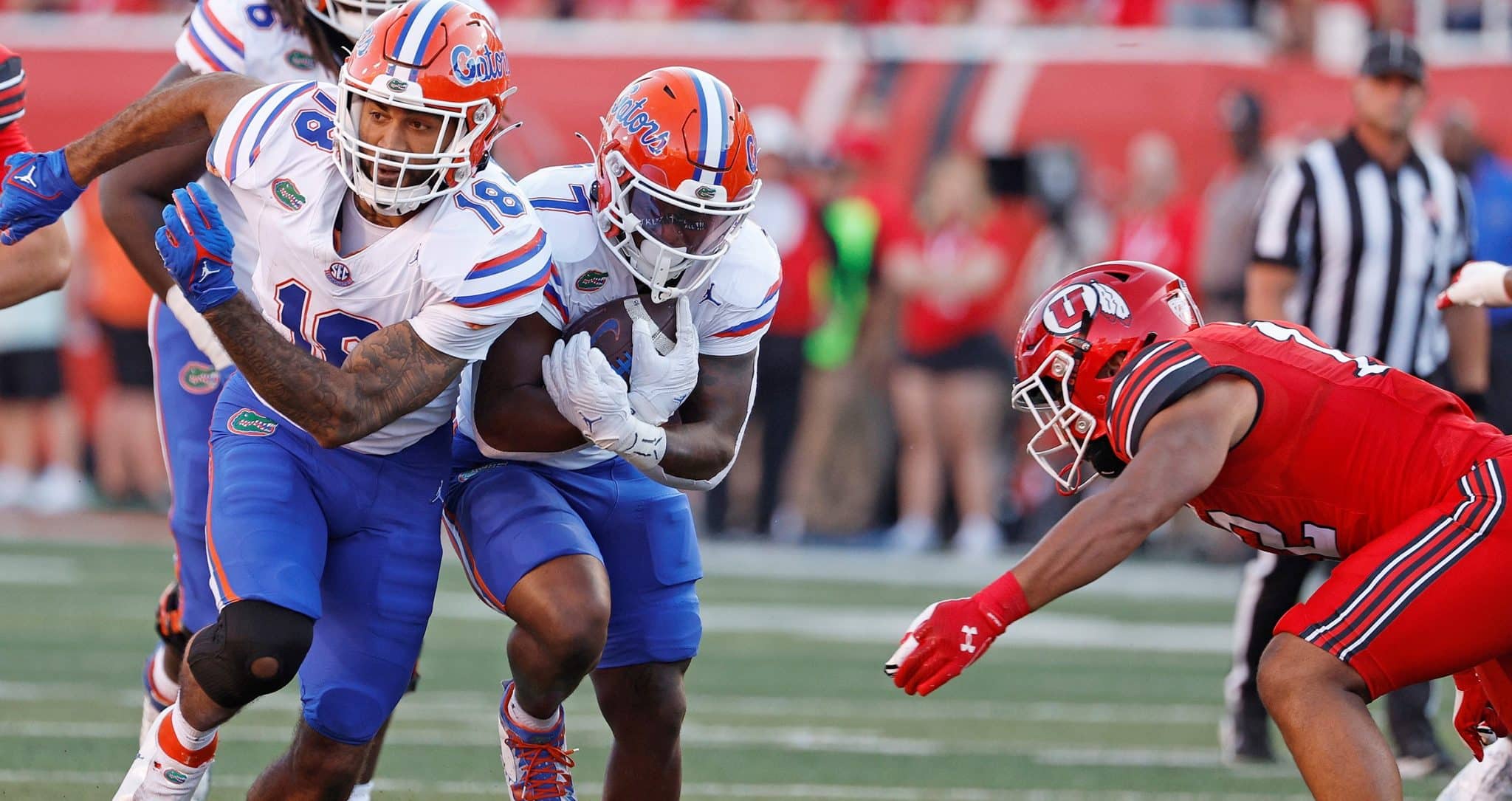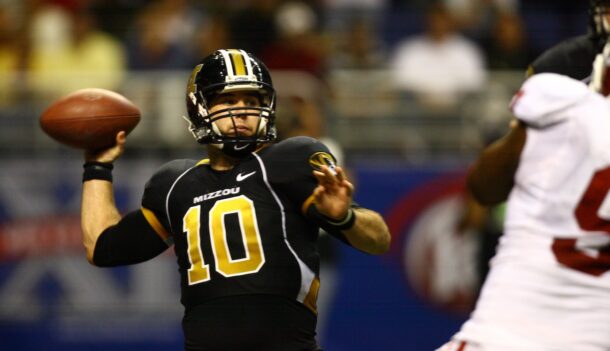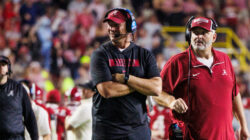
Florida better get the run game going, or it will be a long year in Gainesville
Florida entered the season with one of the best 1-2 punches in college football at running back in junior Montrell Johnson and sophomore Travis Etienne.
They made little difference Thursday night, gaining just 84 yards (only 31 rushing) from scrimmage in Florida’s disappointing 24-11 loss at No. 14 Utah.
Florida’s problems start up front, where a rebuilt offensive line playing without its All-SEC center struggled mightily against an excellent Utah front 7 playing in front of a raucous crowd. The right side of Florida’s offensive line in particular, featuring 2 transfers in Damieon George (Alabama) and Micah Mazzccua (Baylor), were sieves, surrendering constant pressure in the passing game and grading out as the worst 2 of Florida’s 5 starters in run blocking, per PFF.
These numbers are both a reminder that the portal doesn’t cure all sins and a nod to just how good departed studs Richard Gouraige and consensus All-American O’Cyrus Torrence were as run blockers a year ago. Florida has now rushed for just 52 yards in the 2 games since Torrence departed (he opted out of the Las Vegas Bowl) and has shown little ability to open even small holes for Johnson and Etienne to run through.
Johnson, in particular, needs to be able to get to the second level to be dynamic, where he is tremendous at lowering his shoulders and gaining physical yards after contact against linebackers. Etienne is more twitchy, and more likely to break out big runs in confined spaces, but even he found it tough sledding Thursday night, with a long run of just 8 yards despite plenty of jukes and shoulder shimmies along the way.
Florida’s run game issues don’t just start and end up front, though, and that is also of concern, if not equally worrisome.
Why, in a tight game in the first half, did Florida only allow Etienne and Johnson to attempt 5 runs before intermission?
Why, in an effort to ease pressure on Graham Mertz, who played well but is by no means dynamic, would Billy Napier elect to create only 6 first-half touches for his star running backs (Johnson caught a pass and rumbled 17 yards on a lengthy Florida drive in the first half). Why, on 2 separate 3rd-and-shorts in the first half, did Florida use so much pre-snap movement, on the road, in a tough environment, when Johnson ranked 2nd among returning SEC backs in yards after contact?
Napier needs to answer these play-calling questions directly, given that for at least this season, he will continue to call the plays. Whether that is sustainable moving forward into 2024 looks increasingly unlikely by the day, at least if Napier is as reflexive and thoughtful about his own play-calling as he has been about how he operates as program CEO on days that aren’t gameday.
In fairness to Florida, Utah is a tremendous defense.
The Utes returned several starters from a unit that ranked 18th in the country against the run last season and 13th in success rate. They were also at home, where they were almost a full yard (.82 yards) better per play as a defense a season ago. The SEC, while filled with teams who have more 247 Composite talent than Utah, does not have many teams with defenses as good as Utah. On Florida’s SEC schedule, for example, the Gators play just Georgia and Kentucky, among SEC teams, that were better than the Utes last year from a total defense and success rate defense standpoint. The flip side of that, of course, is that many of Florida’s opponents in the SEC, including LSU, Tennessee and South Carolina, are more dynamic offensively than the Utes, and Florida’s defense, which looked solid against a Cam Rising-less Utah offense, won’t be able to hold teams to 24 points all season.
The solution for this Gators team to most the problems it was going to face in 2023 was always supposed to be the star power of Etienne and Johnson. If Florida could establish its identity as a running team that runs first and allows Mertz to manage games, they would likely find more success than most pundits predicted.
In their first significant test, Florida failed.
Mertz threw 44 passes and passed for 333 yards, but that wasn’t a winning formula and won’t be moving forward. When Florida looks back on this season, they’ll likely circle the games where Mertz attempted fewer throws as the games that were a success. Mertz showed Thursday night that against an excellent defense, he can be a capable game manager. He also showed he’s not Superman, or Mertzilla, or a guy who will win you football games because of quarterback play.
Clark Kent quarterback types have won in the SEC before, of course. Greg McElroy, Jacob Coker, early-in-his-career Stetson Bennett III and Jordan Jefferson all ring a bell. But those players won games in bunches because of what was around them, whether it was Mark Ingram and Trent Richardson or Derrick Henry or Brock Bowers and Zamir White or Odell Beckham Jr. and Jarvis Landry. Florida? They don’t have that type of supporting cast, even if the Gators best players on Thursday night, almost to a man, were underclassmen, a testament on the one hand to Napier’s ability to identify talent and recruit it, and former head coach Dan Mullen’s inability to do just that on the other.
Florida’s best 2 players are Etienne and Johnson, and until those guys have holes to run through and game plans designed to maximize their abilities, Florida will struggle on offense in 2023.
A home tilt vs. McNeese State gives the Gators a week to tweak things before Tennessee visits.
Napier and his staff need to optimize that time, or a Florida team that has lost its past 4 games to its main rivals will lose to the Volunteers in Gainesville for the first time in two decades.
Neil Blackmon covers Florida football and the SEC for SaturdayDownSouth.com. An attorney, he is also a member of the Football and Basketball Writers Associations of America. He also coaches basketball.







